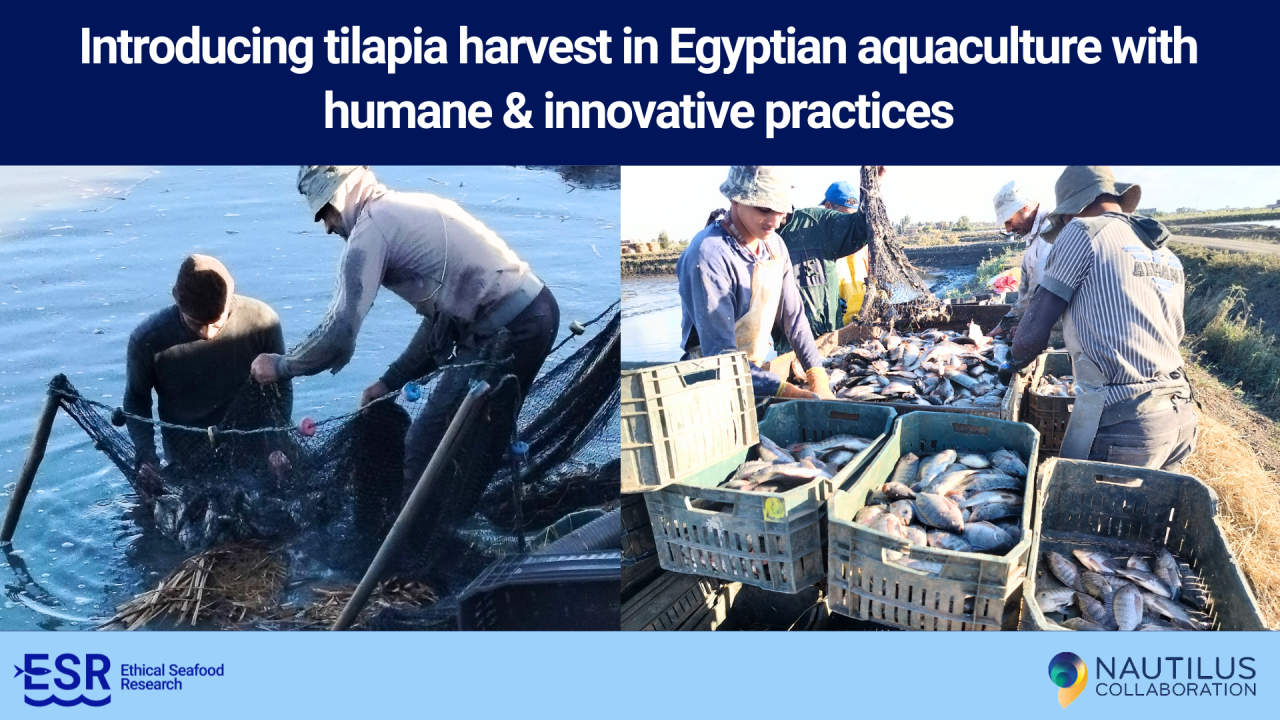Ethical Seafood Research and Nautilus Collaboration have joined forces to improve tilapia welfare throughout the harvest process in Egyptian aquaculture. Our pilot project aims to tackle critical areas such as how to properly crowd fish before harvest, when to withdraw feed and how to remove fish from water in the least stressful way possible, and how electrical stunning fits in the context of Egyptian tilapia aquaculture.
The end goal is to implement humane slaughter techniques, establish best practice protocols and deliver tailored training programs for the mobile harvest teams to help scale up these techniques.
Achieving Humane Slaughter:
Humane slaughter practices benefit both fish welfare and product quality. Studies show that electrical stunning of fishes leads to faster insensibility and reduced behavioural signs of stress compared to the industry-standard chilling method. We will be piloting trials using dry electrical stunning methods at a commercial scale to demonstrate the feasibility of this method for semi-intensive systems in Africa with Egypt as a case study.
To achieve this, the project will employ behavioural indicators of insensibility and carry out post-harvest fillet quality measurements. The findings will then be shared to promote adoption by large producers and the wholesale market. Our outputs will also be shared with our partners FAI for integration into their Tilapia Welfare app, which in turn will assist farmers in better assessing the harvesting and slaughter processes.
Developing Best Practices:
Standard Operating Procedures (SOPs) are crucial for ensuring consistent practices in any industry. Aquaculture is no exception. SOPs for humane slaughter will be implemented across all farms involved in this project. Such procedures act as training tools, reference points, and a means to safeguard fish welfare. While EU regulations mandate SOPs for farmed fish slaughter, their application in tilapia aquaculture in low and middle income countries remains limited, particularly in smaller-scale operations.
This project aims to develop best practice SOPs that align with current Egyptian aquaculture traditions and adhere to the laws that govern the sector. These procedures will be targeted towards both harvest teams and farmers, using clear and concise language with visual aids for effective comprehension and implementation.
Key areas addressed by the SOPs include:
- Pre-slaughter management, including feed withdrawal
- Crowding management, stress indicators, and humane handling techniques
- Implementation of humane slaughter methods
- Product quality evaluation
- Basic biosecurity and disinfection of equipment
Implementing Tailored Training Programs:
Fish welfare at harvest and product quality are heavily influenced by management practices. Previous training programs have demonstrably improved animal welfare and meat quality in other livestock industries. This project will capitalise on previous success by providing specialised training to harvest teams tailored to the context of Egyptian aquaculture.
The training programs will be developed by Wasseem Emam, Sarah Wahltinez, Christine Huynh and Christian van Rijn collaboration with the Egyptian team on the ground made up of aquatic veterinarians and professors from leading universities across the country. The program content will be tailored based on insights gained from stakeholder focus groups to be held in December 2024 and will complement the project’s humane slaughter SOPs.
Conclusion:
This innovative pilot between Nautilus Collaboration, ESR and ESR’s partners on the ground, AQUAVET EGYPT and Kafr El-Sheikh University represents a significant step towards enhancing tilapia welfare during harvest in Egypt, which is arguably one of the most stressful processes of the production cycle from an animal welfare perspective. Through innovative stunning techniques, practical SOPs, and targeted training programs, the project aims to promote humane fish handling and harvesting practices within the world’s third largest tilapia producing country.
We are very grateful to Open Philanthropy for supporting this important work!

